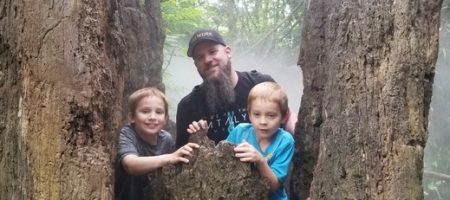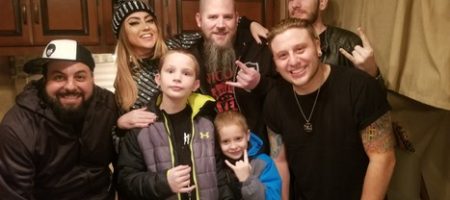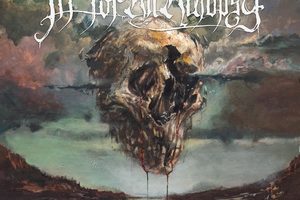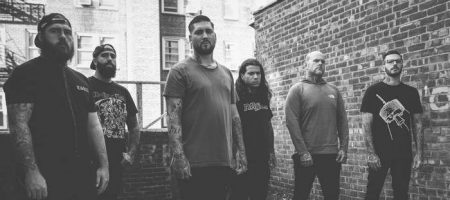Fit For an Autopsy – “Angry People Need Angry Music”
Tuesday, 21st March 2017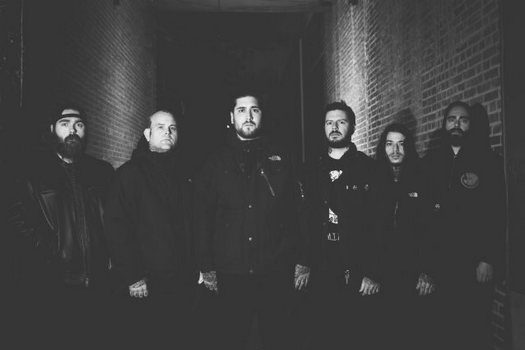
Though the band is certainly much more than this, as they’ve proved with each successive album, angry people do need angry music. And they can get their fill from the guys of Fit for an Autopsy, who have focused on an aggressive and brutal core to their sound, while continuing to expand the boundaries into new and exciting promise. Listen to each album in order and you’ll undoubtedly hear a series of changes as you go, yet the brutal edge has never strayed far from the band’s reach.
Their fourth album, The Great Collapse, personifies this approach. No one will argue that it’s a brutal and rather heavy album, but it’s more than just that. A multitude of influences sink into the music, accentuating both its brutal and melodic tendencies. Perpetually on the road, the band also has spent time proving themselves as a high caliber live act – just as convincing in person as on disc. We were able to grab guitarist Patrick Sheridan for a quick call before the band prepped for another night on tour to discuss the new album, the band’s evolution, and more.
Dead Rhetoric: With your approach and sound, do you feel the band has a lot of options when it comes to touring, as you’ve been out with both death metal and deathcore acts, among others?
Patrick Sheridan: I think that we are palatable to a lot of different people. We have a little bit of something for everyone. Our main style of writing is for people who like heavy metal and aggressive music, but we span the genre – we span a lot of different styles of metal. It’s not for any reason but because it’s what we like. Anytime you pigeonhole yourself – you are limiting your creative process. We don’t say no to anything until we try it. We take into consideration where it can go for the song and try to incorporate things that maybe shouldn’t work, but we find a way to make it work. That’s kind of our thing – it’s like Mission Impossible all the time.
We all like so much music that it’s almost impossible to say no to anything. I would say that it makes us the kind of band that can tour with your seasoned death metal act to your traditional American metal act…anything from like new Decapitated to Thy Art is Murder to Lamb of God and Gojira. We’ll go out with anyone – Deftones, we don’t care. We’ll do it all!
Dead Rhetoric: Do you feel that live experiences have helped to shape and define the band?
Sheridan: 100%. I’ve had so many people say to me that they heard a song and thought it was cool but they never really thought anything else of it because they [pictured us as] a deathcore band. Then they see us live and it’s like, “holy cow, you guys were amazing – you are so versatile and do some many different things.” We spend a lot of time grabbing new fans on the road just as much as we do with CDs.
If you can’t do it live – there’s no reason to make it. We spend a lot of time honing our live show. We don’t use background music/tape-type things…we have samples of noises and a few tiny third guitar parts, since we have three guitar parts and only tour with two, so there’s a couple little things here and there but for the majority of the music – 95% of the music, if not more, is all played live. We don’t want to fake it. It comes across as people thinking it’s impressive because it sounds different – it’s not as stale as bands that are using multiple tracks or doing different things. We try to be like, for lack of a better term, we want to be like the AC/DC of the heavy metal world. We want to do everything live and we want to do it on our own and in the way it’s supposed to be done.
Dead Rhetoric: How do you shift things from having three guitars in studio to only two when you are live?
Sheridan: We try to make it so that everything we write is applicable live with two guitar players. Most of the time, with a third guitar part, it’s some sort of overtone or in the background type of thing, where losing it live won’t be a big deal – or it’s a little string section or noise that we can use in the background when we are playing [live]. We never track any of our rhythm guitars or solos in a way that would make it impossible to play live. So when we write the music, we keep it in mind that Will [Putney] is going to be in the studio and we are going to be on the road, so how can we do cool stuff with three guys but still tour with two? It sounds crazy and the formula is difficult but once it pans out, there is more thought to the music and I feel like it goes over better live.
Dead Rhetoric: What do you feel, as your fourth album, defines The Great Collapse in comparison to your earlier releases?
Sheridan: It’s definitely an evolution. If you listen to all of our records, we never really jump into anything head-on, we always kind of build. When we wrote this record, Will had more time to sit down and he was able to write the songs in a way where he could leave them on the backburner, take a few riffs from us, and put it together – it was a slower approach than we have done with previous records. It allowed us to experiment a little more, so there is definitely a broader sonic approach. There’s very different types of sounds and movements with the music, but we very much stuck to the aggressive style that we had before. I think from Absolute Hope to The Depression Sessions you could hear the difference between the songs on that record and the song “Flatlining.” From “Flatlining” to where we are now is a natural progression. It’s definitely a bigger record, it’s definitely a different kind of sound for us, but I still think we managed to hold onto that aggressive thing that we do. I think people will be surprised by some of the direction, but they’ll be happy that we didn’t just jump off the deep end and completely change everything.
Dead Rhetoric: Many bands that evolve and change often get criticized but Fit for an Autopsy doesn’t seem to generate much in that regard. Do you think that this continued evolution is part of that reason?
Sheridan: One thing that I always say in interviews is that we are going to do what we want. If we wanted to write a rock n roll record, then we are going to write a damn rock n roll record, and if no one likes it, we’ll still be stoked because we did what we wanted to do. That’ll probably never happen, but just to use it as an example. For me, I think we have built and established our sound tastefully. We’ve never done anything for a specific reason other than it being what we wanted to do, so it comes off as natural. We aren’t like, “oh man this band is doing this now so we are going to do it, or we are going to sound like these guys because they sold 6,000 records in the first week or because they have the most fans.” We just broke off and went in our own direction from where we were.
We have so many musical influences from Will being an engineer and producer and working with some of the best bands in the industry, and Tim [Howley] and Josean [Orta] being into classic rock bands and more straight-forward stuff – and all of us coming from the hardcore and punk rock scene…there’s a million influences. I listen to Radiohead and Steely Dan more than I listen to most death metal bands. It’s going to sound different and change from record to record, and it’s supposed to be a growth and a change, so when we do it and people see us doing it, they say it’s okay because we’ve always done it. Every record sounds different, so they expect it from us. We have been getting compared to Gojira recently, and first of all, that’s amazing…they are one of my favorite bands, and if you want to compare me to Gojira, I’ll buy you some flowers and say thank you [laughs]. But at the same time, they are an ever-evolving band – from record to record they sound different. We want to be like that – be a band that’s acceptable at that level.
Dead Rhetoric: One thing that is sticking out is the element of aggression – do you see that as your core and you can build outwards from it?
Sheridan: Absolutely. One of the things about the guys in this band is that we’ve all had some pretty interesting experiences in life, and we have all come from pretty different places. One thing that we can all agree on is that aggressive, heavy music has gotten us through rougher times in our lives, moved us through things, and helped us feel like we are attacked to something. Angry people need angry music. I feel like with what we are doing, and we are doing more melodic and clean guitars/vocals, but we are also making the heavier parts heavier…and the more aggressive parts more aggressive.
We are creating this texture between parts that makes the clean parts sound prettier and the aggressive parts sound insane. It’s the idea that if everything is heavy for 3:30, you can kind of lose the heaviest part – but if everything has a different kind of structure and it’s put together in a way that you have the less aggressive part…the heavy part hits and its like “whoa.” I feel like that is a really cool thing that we are discovering in our music and writing is how to balance that. That’s very much working for us. It’s the very thing that is starting to separate us from our other records – the ability to create music in a way that the parts stand out within the songs, as opposed to just one part standing out.
Dead Rhetoric: I really enjoyed the cover for the new album – where did the concept for the art come from?
Sheridan: I’m a tattoo artist and one of the things I’m influenced by is the Buddhist and Asian artwork that is used in tattooing. One of those things is the Buddhist Wheel of Suffering – it’s [the artwork] just a play on it. It’s not a copy of it or simply that thing – it’s a circle and it has all these different stages of life and stages of human life in it. So we took that idea of making a wheel and starting off with nature and the first sign of man. Then war and all these different things, and then outer space. It’s an evolution of what humans are doing. We felt like it reflected where we are at in the world right now, and the way that humans are, and how things can end up if we aren’t a little smarter.
Our lyrics are very much about the human experience and how people treat each other and where we are globally now. So we wanted our artwork to reflect that but not in a way that was cheesy. So we hit up Adam Burke and he found a way to tie the art into the mood of the record. If you look at it, you can see all types of stuff going on in the circle, and around the outside of it as well. All of the influences of life and all the crazy things that can be applied. It’s a pretty cool thing, and he really crushed that artwork – we are really happy with it.
Dead Rhetoric: Could you also discuss what went into your recent video for “Heads Will Hang?”
Sheridan: America is a super-safe place in comparison to a lot of other places. Recently there was the refugee crisis that happened and there were a lot of strange responses, especially from Americans, in a very negative connotation. That led to the idea of “what would we do if that happened to us?” What if your family was forced out of its home due to the decisions of the government and politics that are out of your hands…and how would you feel about life and people in that situation after having to deal with it on your own? If you watch the video, it’s the American family: mother, father, and child enjoying the home and hard work. Then it gets stripped from them – they don’t have water left…they have to go out and search for food and water, and eventually they get separated. It’s kind of like our loose interpretation of “what would you do if it happened here, on our own land.” We’ve never had to deal with that before and I think that’s a pretty scary concept.
Dead Rhetoric: There’s touring now and more once the album releases – is that the mainstay for now?
Sheridan: We are finishing up the Carry the Flame tour and it will run until March 22nd. Then we will do a handle of headliners out to South by So What? Then we are doing more headliners up to Canada and we will do some dates with Unearth. After that, we go home for a little bit and we are actually putting together a [US] headliner in June/July. Then we will head over to Europe and are playing 10 festival dates, including Wacken, Summer Breeze, Destruction Derby, and Metaldays. In between festival dates we are doing a few dates with Architects, a few dates in Germany and here and there. Once we are home, we are trying to figure out what to do for the fall. There is no break planned in the near future for touring. We just want to get the record out to as many people as we can and push it as hard as we can.
Dead Rhetoric: Seems like you are off to a good start!
Sheridan: We are really lucky – a lot of people and media sources are interested and the response has been really great. I feel like we are really lucky to be a band who is coming out of the world we are in and being appreciated on so many levels. We appreciate everything everyone is doing for us, and we are a super humble bunch of guys – we are just lucky right now. We want to keep the momentum going and keep giving back to everybody and push forward. Everything we can do to get out and play is the most important thing right now. It sounds crazy, and at 41 years old you never expect it to happen. People are paying attention and we are pretty stoked that things are going well.
Fit for an Autopsy on Facebook













